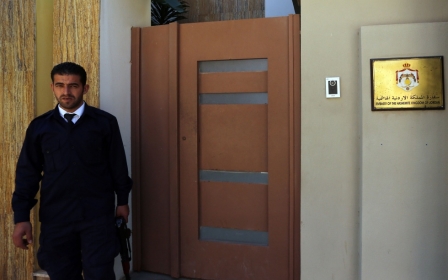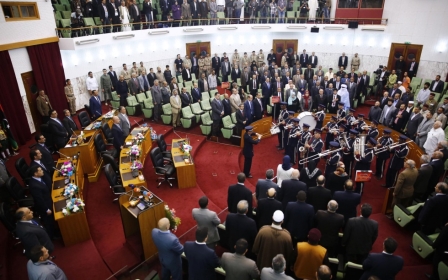Game theory, kidnappings and the pitfalls of appeasement in Libya

On the face of things, it might seem a fair proposition to speculate that high-level decision makers in the Jordanian or Libyan governments would understand iterative game theory – the study of strategic decision making - better than the thugs of ragtag Islamist militias.
However, recent events suggest the Libyan militias are geniuses at extortion, blackmail, kidnapping, and intervening in the political process. So much so, that it seems they are displaying a good grasp of the nuances of game theory.
Apologists for the post-Muammar Gaddafi National Transitional Council and General National Congress say the Libyan state simply lacks the military capacity to face down its opponents. This argument is a hollow reed, because it ignores that the majority of the Libyan people do not side with the militants and would support the government if it simply had better PR and was more resolute in its decision making.
Debate over how to best deal with Libya’s militias intensified after the Jordanian government last week agreed to release a known bomb plotter in exchange for its kidnapped ambassador, Eitan Fawwaz. The militant, Mohamed Al-Drissi, was imprisoned in 2007 for planning to blow up the Amman airport.
This was not only a bad trade, it also shows an appalling lack of insight into the dynamics of appeasement and the iterative nature of game theory. The Jordanians' attempts to deny that they have negotiated with kidnappers and terrorists have been manifestly shown as false and actually self-defeating. It is clear the Jordanians are fully aware of the humiliating deal they have struck and the negative precedent they are setting.
New MEE newsletter: Jerusalem Dispatch
Sign up to get the latest insights and analysis on Israel-Palestine, alongside Turkey Unpacked and other MEE newsletters
As Karim Mezran, Mohamed Eljarh and I have explained in a recently published Atlantic Council report, “Libya's Faustian Bargains: Ending the Appeasement Cycle”, appeasement is always a trap - the more you practice it the harder it becomes to break out of the cycle.
In this instance, the Jordanian government's agreeing to the kidnappers' demands makes it only more likely that other groups will engage in kidnappings to secure their objectives. It bears repetition that in the past five months, Egyptian and Tunisian diplomats and a South Korean businessmen have all been kidnapped to be used as pawns in negotiations.
Appeasement is always a trap - the more you practice it, the harder it becomes to break out of the cycle
Earlier this year, kidnapped Egyptian embassy workers were traded for a Salafist Sheikh, while the son of Wanis Bukhamada, the head of a special forces unit in Benghazi, was kidnapped. The response should have been a coordinated response between the Libyan government and the affected foreign countries.
What has played out is that each victim country or family has acted unilaterally to preserve their own interests. Unsurprisingly to those familiar with game theory, the decision on behalf of the Egyptian government, spawned the copy cat kidnapping of the Jordanian Ambassador.
Now because the Jordanians have caved in, it is difficult to foresee an end to this epidemic of kidnapping until Libya either develops functional security services or foreign countries no longer allow their businessmen or diplomatic staff outside of heavily fortified compounds. Which will happen first is anyone's guess.
I hope the former, but the trend towards the latter is accelerating and it will make Libya even more ungovernable than it is now, because foreign businessmen (Arab, African, Asian, as well as Western) are needed for the smooth functioning of Libya's economy, just as foreign diplomats are essential to secure the capacity building arrangements which the Libyan government and private sector needs to acquire the skills to function in today's globalized world and to compensate for Libya's lack of institutions.
It is natural to wonder if the Jordanians or Egyptians could have done otherwise. On the surface, it appears that they were snookered and simply had to cave into militias demands to get their personnel freed and needed to do so because their domestic constituencies (such as the victims' families) demand that this lever be pulled.
Yet on deeper investigation, that is only the short-term picture. In the long term, Jordan, Egypt, Tunisia, the UK, US, Italy, and France have many levers to play in Libya. They can build a multilateral coalition to engage in capacity building, vocational training, institution building, and supporting of the Libyan constitutional process. Libya needs the outside world more than the international community needs Libya. In response to these kidnappings, all interested states should band together to recreate the international coalition which toppled Gaddafi and utilize it to win the peace. Sporadic bilateral action has proved insufficient.
So the situation in Libya today has reached something of the natural conclusion of the cycle of appeasement of which kidnappings are only one manifestation. Other key manifestations are granting important government posts to militia- or jihadist-aligned individuals such that whole branches of the government, especially the Defence or Interior ministry, have been colonized by specific localities, regions, or militias.
The primary issues must be solved by Libyans themselves, who need to confront the enemies of law and order in their own midst and double down on their transition process to constitutional governance. Nonetheless, Libya's nascent central authorities could use a little help from their friends.
- Jason Pack is a researcher of Libyan history at Cambridge University. He has advised NATO and its member states on the need for a multilateral approach to security challenges in Libya. He is also editor of the 2011 Libyan Uprisings and the Struggle for the Post-Qadhafi Future and President of Libya-Analysis.com.
The views expressed in this article belong to the author and do not necessarily reflect the editorial policy of Middle East Eye.
Photo credit: Mohamed ben Sheikh, a kidnapped hostage from the Tunisian embassy in Libya, pleading with the authorities in Tunis to negotiate with his captors (AFP/You Tube)
Middle East Eye delivers independent and unrivalled coverage and analysis of the Middle East, North Africa and beyond. To learn more about republishing this content and the associated fees, please fill out this form. More about MEE can be found here.




